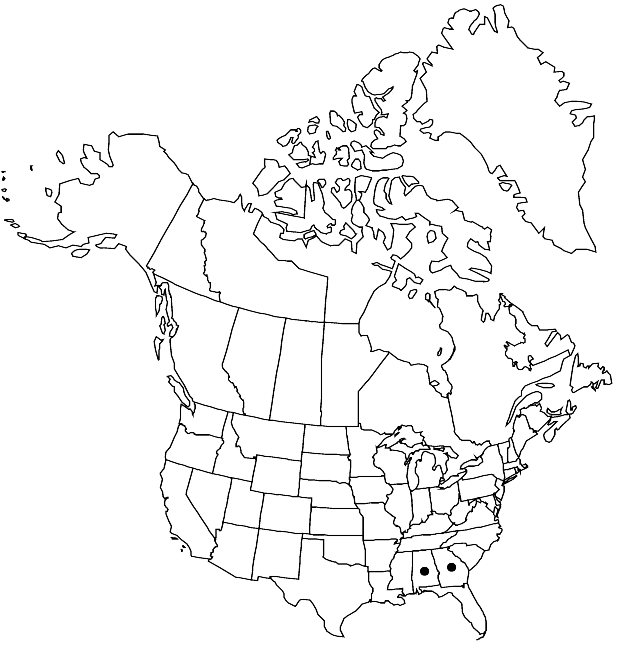Difference between revisions of "Arabis georgiana"
Torreya 3: 88. 1903.
FNA>Volume Importer |
FNA>Volume Importer |
||
| Line 24: | Line 24: | ||
|distribution=Ala.;Ga. | |distribution=Ala.;Ga. | ||
|discussion=<p>Of conservation concern.</p><!-- | |discussion=<p>Of conservation concern.</p><!-- | ||
| − | --><p>Arabis georgiana is most closely related to A. pycnocarpa, from which it is easily distinguished by having narrower fruits, longer petals, and subsessile cruciform or 3-rayed trichomes on abaxial surfaces of basal leaves. It is known only in Alabama from Bibb and Elmore counties and in Georgia from Stewart County.</p> | + | --><p><i>Arabis georgiana</i> is most closely related to <i>A. pycnocarpa</i>, from which it is easily distinguished by having narrower fruits, longer petals, and subsessile cruciform or 3-rayed trichomes on abaxial surfaces of basal leaves. It is known only in Alabama from Bibb and Elmore counties and in Georgia from Stewart County.</p> |
|tables= | |tables= | ||
|references= | |references= | ||
| Line 48: | Line 48: | ||
|publication year=1903 | |publication year=1903 | ||
|special status= | |special status= | ||
| − | |source xml=https://jpend@bitbucket.org/aafc-mbb/fna-data-curation.git/src/ | + | |source xml=https://jpend@bitbucket.org/aafc-mbb/fna-data-curation.git/src/8f726806613d60c220dc4493de13607dd3150896/coarse_grained_fna_xml/V7/V7_345.xml |
|tribe=Brassicaceae tribe Arabideae | |tribe=Brassicaceae tribe Arabideae | ||
|genus=Arabis | |genus=Arabis | ||
Revision as of 17:56, 18 September 2019
Biennials; sparsely to moderately hirsute (at least basally), trichomes simple, mixed with fewer, short-stalked, forked ones, subsessile cruciform or 3-rayed stellate trichomes commonly on abaxial blade surfaces, sometimes plants glabrous distally. Stems simple or few from base (rosette), erect, unbranched or branched (few) distally, 3–7 dm, (hirsute basally, glabrous distally). Basal leaves: petiole 0.5–2 cm, (ciliate or not); blade spatulate, oblanceolate, or obovate, 1.5–6 cm × 5–15 mm, margins dentate, apex obtuse or acute, abaxial surface moderately to sparsely pubescent, trichomes subsessile stellate, adaxial surface subglabrate or sparsely stellate. Cauline leaves 7–26; blade oblong, lanceolate, or linear-lanceolate, 1.5–7 cm × 3–18 mm, base auriculate to subamplexicaul, margins dentate or entire, apex acute or obtuse, pubescent as basal leaves except distalmost leaves often glabrous. Racemes often simple. Fruiting pedicels erect to erect-ascending, 7–16 mm, (glabrous). Flowers: sepals oblong, 2.5–4.5 × 1–1.5 mm, lateral pair subsaccate basally; petals white, narrowly spatulate or oblanceolate, 6–9 × 1–1.5 mm, apex obtuse; filaments 3–4.5 mm; anthers oblong, 0.8–1 mm. Fruits erect to erect-ascending, (often subappressed to rachis), smooth, 4–7 cm × 0.7–0.8 mm; valves each with midvein extending full length or to middle; ovules 38–44 per ovary; style 0.7–1.8 mm. Seeds narrowly winged throughout, oblong, 0.9–1.9 × 0.5–0.7 mm; wing to 0.1 mm wide distally.
Phenology: Flowering Mar–Apr.
Habitat: Stream banks, roadsides
Elevation: 0-200 m
Discussion
Of conservation concern.
Arabis georgiana is most closely related to A. pycnocarpa, from which it is easily distinguished by having narrower fruits, longer petals, and subsessile cruciform or 3-rayed trichomes on abaxial surfaces of basal leaves. It is known only in Alabama from Bibb and Elmore counties and in Georgia from Stewart County.
Selected References
None.
